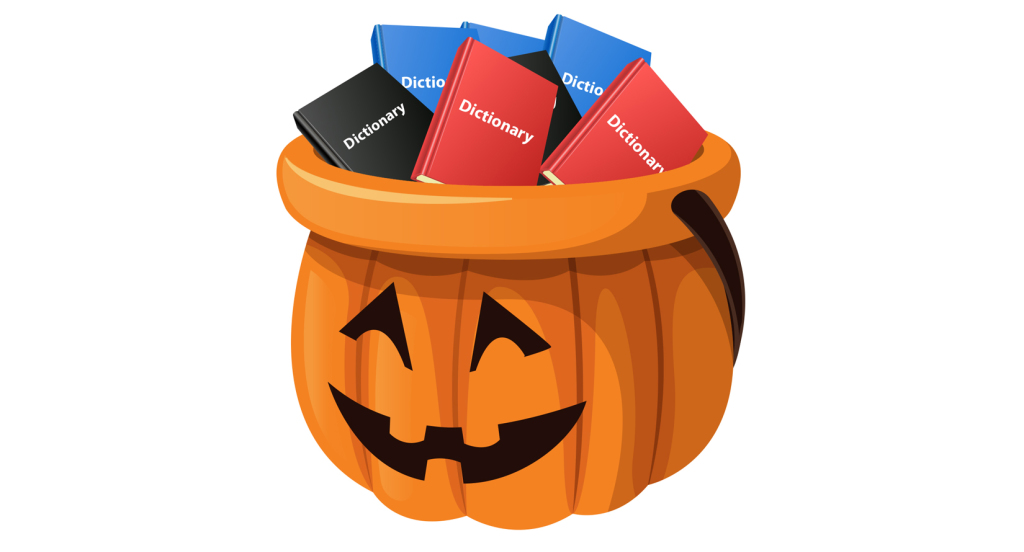25 Nov 2014
Questions for a Language Ninja: Holiday Grab-Bag
Welcome once again to Language Ninja’s Q & A, where the Ninj answers burning grammatical and common usage questions. This week, we bring you a Holiday Grab-Bag of grammatical gaffes. Let’s get started!
Q: What is the difference between the terms ensure and insure? Don’t they essentially mean the same thing?
A: Eh… sort of. Not really.
Basically, the verb to ensure means to make sure/certain of. The verb to insure, on the other hand, means to provide protection against some kind of difficulty. These two definitions may seem kind of similar, but when you consider that insure is used only within the context of easing a financial or personal burden, while ensure carries no such specific good/bad implication, the distinction becomes clearer. By oiling the springs on her homemade spike traps, Gladys ensures the projectiles will easily pierce through the hearts of her victims.
Read More
18 Nov 2014
Abandon All Hope, Ye Who Enter Here
This familiar passage from Dante’s Inferno might as well become the new slogan of Waterstones, a major UK book retailer that recently garnered major media attention when an American tourist was locked in their Trafalgar Square bookstore after they closed up for the night. While our hapless hero used the Internet in the upstairs section, the staff apparently clocked out, locked up and went home. Unsure of what to do, he eventually tweeted his situation from his smartphone, and was instantly flooded with book recommendations from concerned tweeters who wanted to make sure he had enough quality reading to square him away for the night. Heaven forbid he would end up with something sub-par to read! He became an overnight Twitter sensation and was retweeted more than 12,000 times by the following afternoon. The tourist was freed after a couple of hours, which, unfortunately, he did not use to peruse the length of Fahrenheit 451 or delight in the witty prose of Jonathan Safran Foer. “I people-watched from the window,” he later said in an interview. To each his own.
Read More
The Internet abounds with examples of “Engrish”—signs, menus, and other writing, poorly translated into English. For example:
- “Carefully slip and fall down.”
- “Please present your octopus.”
- “If you are stolen, call the police at once.”
Although English speakers find these amusing, did you ever stop to think that it works both ways—that non-English speakers might get a laugh from writing that is poorly translated from English? I’ll spare you the suspense: Yes.
Read More
04 Nov 2014
Dispensing With the John Hancock
I just left the DMV in midtown Manhattan. Let’s place my current emotional state somewhere in the sixth circle of Hell (Heresy), smack dab between Anger and Violence.
In truth, it wasn’t as dreadful as you might imagine. With facilitators armed with tablets to constantly update customers on their expected wait times and plenty of city bureaucrats to process paperwork, I was in and out in around 45 minutes. But during my time there, I must have signed my name 15 times, each scrawl looking a little less legible and feeling less like a stamp of authenticity and more like an excessive burden with little meaning in a digital world.
So I ask: is the signature dead? What relevance does your John Hancock have in today’s wired society?
Read More
With October 31st around the corner, it’s the perfect time to discuss a subject that’s near and dear to my heart: What happened to the apostrophe that used to live in Hallowe’en? And how long has it been missing?
For years, I thought I’d never find that charming throwback to Ye Olde Worlde punctuation, but then I’ll be darned if it didn’t turn up the other day gratuitously tacked on to the title of the Lands’ End catalog. At least, I think that’s the same one. Or maybe the Lands’ End bonus apostrophe is the rogue migrant that’s missing from Maurices clothing chain store, and has nothing to do with Hallowe’en at all.
Read More
The Language Ninja is back, answering your burning grammatical questions. Of course, if the burning persists post-answer, see your doctor.
Q: What’s the difference between “who” and “whom,” and does it matter?
A: Well, the difference matters as much as any non life-threatening issue matters. The Ebola virus certainly doesn’t give a damn.
But, for those of you who either possess a high degree of intellectual curiosity or grammar-specific OCD, the who/whom distinction could be a weighty issue.
Read More
Commodities have been on my mind as of late. I’m not talking about the “Trading Spaces” kind, but rather those that are mistaken for commodities when they’re actually not — especially services. This all came about when a client of mine requested that we chat about a new direction for his company’s blogs. We’d been focusing on some of the graphic design elements of the company’s service offering and hadn’t received much feedback as of late, so when I was contacted to discuss details, I got excited. Feedback and client involvement is a strong component in effective, targeted content.
Read More
Ah, fall: my favorite time of year. I’m not a full-fledged drive-thru maven in yoga pants with an uncontrolled addiction to #PSLs, but I do love a touch of fall flavor. Interestingly, autumn is really a season of decay in some senses: the leaves wither and fall, the air turns colder, and warm ovens turn the harvest’s bounty into pie after pie.
Even though this season is about things falling away, it’s still impossibly joyful for many people. Perhaps it’s our collective recognition of the fact that when things wither and die, they will come back renewed after a winter of rest. Whatever it is, we can’t get enough of fall. And perhaps the world of business writing, copy, and marketing could use a touch a pumpkin spice.
Here are a few lessons we can all glean from some of fall’s most cherished pastimes and traditions. This is an excellent time of year to do a bit of “cleaning house,” just as we pack away the shorts and bring out the sweaters with October’s first chill.
Read More
 Question: Ninja, tell me truly. Is grammar important, really?
Question: Ninja, tell me truly. Is grammar important, really?
Answer: Yes, of course! With a caveat.
See, grammar exists as a structure for the efficient communication of ideas. When we uniformly accept the common standards for a particular language, we are able to say what we mean and mean what we say. However, humans made the rules, and humans can gosh-darned well break them, too. Screw you, academia!
Language is Fluid
Language is fluid; usages change and we may even begin to use basic terms in radically different ways. The word hack may seem innocuous enough, but there are no less than seven common definitions for this one little term, and we aren’t even counting the archaic falconry and cheese-making associations (“I’m still hacking[1] up my lungs from when I had to hack[2] my way out of my burning apartment with a Rachel Ray kitchen knife, after that hack[3] who hacked[4] into my life-hack[5] website dropped a lit joint on my shag carpet, then called a hack[6] and fled because he couldn’t hack[7] it”).
Read More
23 Sep 2014
Oh, Did You Want WRITING in Your Blog, Too?
Everywhere you look, advice on SEO marketing and increasing site traffic are all “blah blah blah” about the all-powerful content. How to improve your content. How to create engaging content. How what you thought was good content at one time is now no longer acceptable because of reasons. (And, on a related note, how to spiff up existing content.)
At the frontline of content creation stands blogging. Blogs started out as the business equivalent of a “Dear Readers,” but let’s be honest: most blog posts these days have almost nothing to do with actual writing anymore. They’re all about cross-marketing and the multimedia experience, or how many images to include and at what resolution and which designer can hook you up with a really swell infographic.










